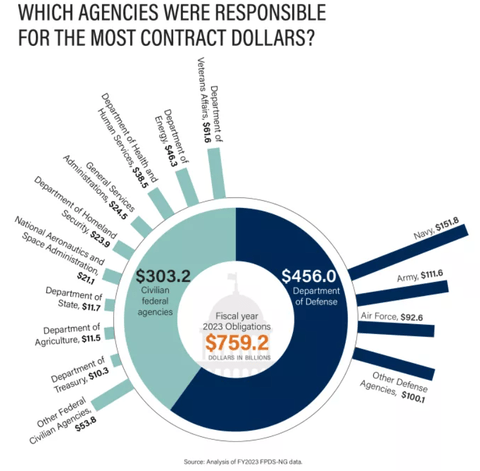
Chris Edwards
Next year, the new president will face budget deficits and interest costs spiraling upwards. He or she will need to find spending to cut. How about all the waste and overcharging in federal contracting?
The federal government procures more than $750 billion of goods and services a year, with the Pentagon accounting for 60 percent of the total. Federal contractors are known for cost overruns, inflated profits, and sometimes corruption.
Raytheon is currently in the spotlight for a major Department of Defense (DOD) rip off. From the US Department of Justice last week:
[F]rom 2012 through 2013 and again from 2017 through 2018, Raytheon employees provided false and fraudulent information to the DOD during contract negotiations concerning two contracts with the United States for the benefit of a foreign partner — one to purchase PATRIOT missile systems and the other to operate and maintain a radar system. In both instances, Raytheon employees provided false and fraudulent information to DOD in order to mislead DOD into awarding the two contracts at inflated prices. These schemes to defraud caused the DOD to pay Raytheon over $111 million more than Raytheon should have been paid on the contracts.
… Raytheon also entered into a civil False Claims Act settlement to resolve allegations that it provided untruthful certified cost or pricing data when negotiating prices with the DOD for numerous government contracts and double billed on a weapons maintenance contract. Under the False Claims Act settlement, which is the second largest government procurement fraud recovery under the Act, Raytheon will pay $428 million for knowingly failing to provide truthful certified cost and pricing data during negotiations on numerous government contracts between 2009 and 2020, in violation of the Truth in Negotiations Act (TINA).
… Raytheon also admitted that by misrepresenting its costs during contract negotiations it overcharged the United States on these contracts and received profits in excess of the negotiated profit rates. Further, Raytheon admitted that it failed to disclose truthful cost or pricing data on a contract to staff a radar station. Raytheon also admitted that it billed the same costs twice on a DOD contract.
Raytheon was also hit for violations of foreign corruption and arms control laws for a total of $950 million in fines. How often does such Raytheon-style cheating take place? After a six-month investigation last year, CBS News reported, “Military contractors overcharge the Pentagon on almost everything the Department of Defense buys each year, experts told 60 Minutes.”
If true, procurement reform has a lot of potential. This Government Accountability Office chart suggests which agencies the new administration should target for savings.
For more information, R Street held a recent forum on waste in federal contracting.





